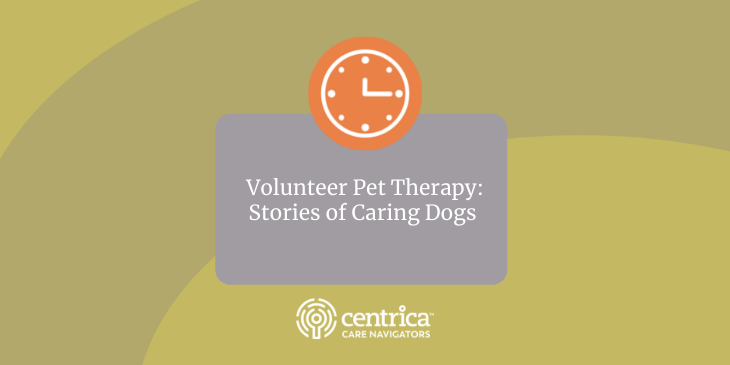Our patients have a lot of visitors most days: caregivers, doctors, hospice aides, nurses, and more. They do their best to help, but there’s only one visitor who’s guaranteed to be a friendly face every time.
This year, almost a dozen Centrica Care Navigators volunteers are bringing pet therapy dogs to visit with patients in their homes and at our hospice sites. Dogs sit quietly with patients, move close by so they can be petted, and sometimes even play – whatever the patient wants.
“My dog loves the scratches and belly rubs,” says volunteer Tami Young, who will visit patients this year with her dog Lebowski, a Golden Retriever. “I like seeing the joy in peoples’ faces.”
Comforting canines
You’re probably familiar with service dogs, like “seeing eye dogs” that travel with people with visual impairments, or dogs trained to alert others if there’s a life-threating incident with the person they serve. They’re trained to handle tasks like smelling changes in people with diabetes and to help counteract post-traumatic stress disorder reactions.
There are also emotional support animals, which provide comfort to people with conditions like severe anxiety and phobias.
At Centrica Care Navigators, we have volunteers with 11 pet therapy dogs, including two Goldendoodles and a pair of Dalmatians, among others. A therapy dog isn’t meant to be a comfort for the volunteer (though as Tami says, it feels that way to her); they’re meant to help patients in end-of-life care.
Judy Packard has been volunteering with her dog Sophie since 2014, when Sophie was just two years old. Judy says Sophie, a Brittany, enjoys being petted. She knows when someone needs her to be close by.
“She’s big on getting on a chair or bench where you’re sitting,” Judy says. “Just coming in the room (gets a reaction). She just walks right over; sometimes she puts her front feet up on the bed.”
Other kinds of animals also work as pet therapy animals, but the majority – and all the pets at Centrica Care Navigators – are dogs.
The personal experience
Like many Centrica Care Navigators volunteers, personal experiences are what got pet therapy volunteers interested in devoting time to helping with hospice care. Tami Young is a retired recreational therapist and social worker, whose mother stayed at Rose Arbor Place during her care. Judy Packard remembered how much her brother enjoyed seeing his dog visit during his time in hospice. She wanted to create the same experience for others.
Judy says many patients who see Sophie start taking about dogs they had during their lives.
“For that time, their minds are away from what’s happening to them,” she says.
Dog Dedication
All Centrica Care Navigators therapy dogs are part of the Alliance of Therapy Dogs, which certifies dogs are obedient and able to stay calm even in a room full of strangers. Another program, Pet Partners, also offers certification.
Once volunteers complete their training with the agency, the certified dogs are able to begin visiting with patients and others. Lebowski travels to Rose Arbor Place in Kalamazoo every Tuesday, but he also has appointments at Western Michigan University and Kalamazoo College to work with students, and at the library in Lawrence, often to visit with younger children.
As more and more communities welcome visitors after the COVID-19 lockdowns, therapy dogs and their owners are seeing more appointments on their schedules. That’s just what Sophie was looking for.
“(During COVID,) she really missed it,” Judy said. “When she goes to therapy sessions she wears a certain collar and leash. I would see her go and sniff it sometimes.”
Volunteers wanted
Even a team of 11 therapy dogs isn’t enough to visit all the patients who want a little time with a pet. There’s always room for more dogs with certification and the time to spend with patients and their loved ones.
“It warms my heart, how she can bring a smile,” Judy says. “You’re sad because you know the person is dying, but her presence makes people feel good.”
Anyone who’s interested in the therapy dog program can visit our website, email volunteer.mail@CentricaCare.org, or call 269.345.0273.
Our Mission is to guide and support individuals and their caregivers coping with illness, aging, dying, and loss by providing compassionate medical, emotional, spiritual, and personal care.



